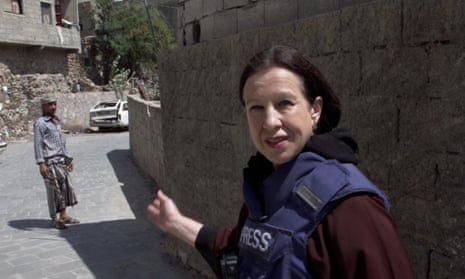This summer will usher in some of the worst catastrophes the world has ever seen if the pandemic is allowed to spread rapidly across countries already convulsed by growing violence, deepening poverty and the spectre of famine, the BBC war reporter Lyse Doucet has warned.
Speaking exclusively to the Observer, she says she fears “a terrifying mix of violence and the virus” will soon overwhelm countries such as Yemen, Afghanistan and Somalia, where Covid-19 has yet to reach its peak. Already, in southern Yemen, gravediggers can’t keep up with the dead and dying, she says. “Conflict will also be magnified and multiplied by impoverishment, starvation and despair … Expect a hot summer.”
She will take part in Reimagining Victory, an online series of events for the Imperial War Museum Institute and the peacebuilding charity Conciliation Resources to mark the 75th anniversary of the end of the second world war this summer.
Doucet, who was awarded an OBE for services to broadcast journalism in 2014 and has been reporting on war for the BBC for over 30 years, can clearly see the trajectory of the pandemic for the most desperate and vulnerable. “We live in Britain. We hear about unprecedented, unthinkable levels of spending and the safety nets that better resourced, relatively wealthy countries are throwing out to catch everyone before they fall. But in places of conflict, they don’t have those safety nets. There, people are already living on the edge,” she says.
The economic damage the coronavirus has wreaked upon the world – for example, destroying the income of labour migrants who regularly send money back home – will only deepen the hunger and deprivation in war-torn countries, and feed feelings of injustice and hopelessness there, Doucet says. “Covid-19 is not just about lives, it’s about livelihoods. When you destroy people’s fragile livelihoods, you also destroy lives.”
With so many people living hand to mouth in these countries, the further economic cost of “staying at home” will be as fatal as the virus itself, even when it is circulating rapidly. “The developing world will face nightmare scenarios. There aren’t enough resources to either test or treat – and because of corruption, the wealthy will get the resources that do exist.”
Some will be tempted to join fighters and rebels who promise to pay them so they can feed their family and keep them safe. “It catches your breath. Countries which have already lived through the worst of times could face unthinkable pressures and hardships in our time.” In many of these places, she says, “there will be violence and the virus for some time to come”.
Yet she fears that all this feel very distant to people in Britain and other wealthy nations right now, with many believing they’re living through “the world’s worst humanitarian crisis” at home. “When there’s protests filling the streets of our countries, will there be space – in the headlines, in the broadcasts, in our aid budgets and in our hearts – to also help people who are going to suffer far more than us, in much more profound ways?”
For journalists like Doucet, who believe the best way to report on conflicts is on the ground, face-to-face, in the heat and the dust – rather than on a computer or a phone – the health risks have multiplied. But, despite the pandemic, she says she is looking forward to returning to the places she normally reports on, hopefully by the end of the year. “No story is worth dying for, but there are stories worth taking risks for. We have to protect our lives, but we also have to protect our journalism. These stories matter. They have to be told.”
On 30 June, Doucet will chair an online panel, Mission accomplished? Victory in the age of endless wars, on the Imperial War Museum YouTube channel
